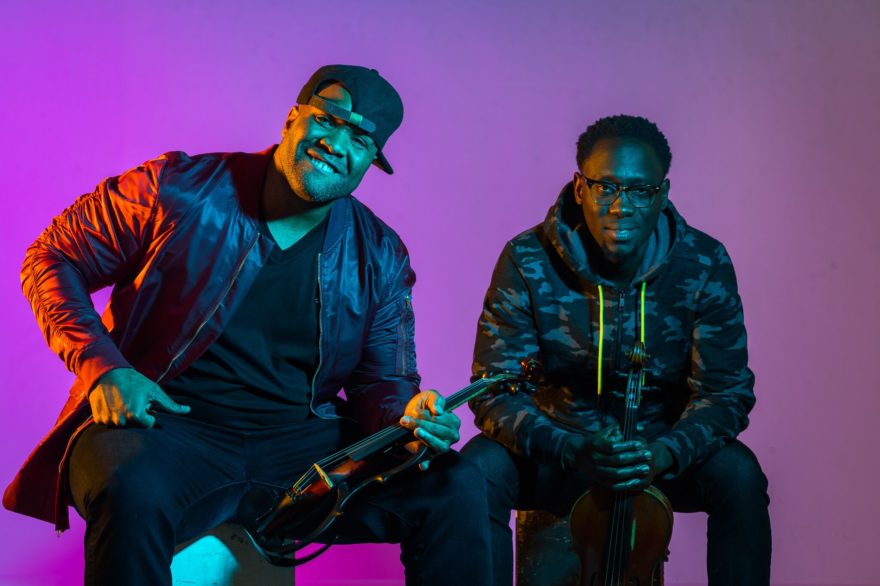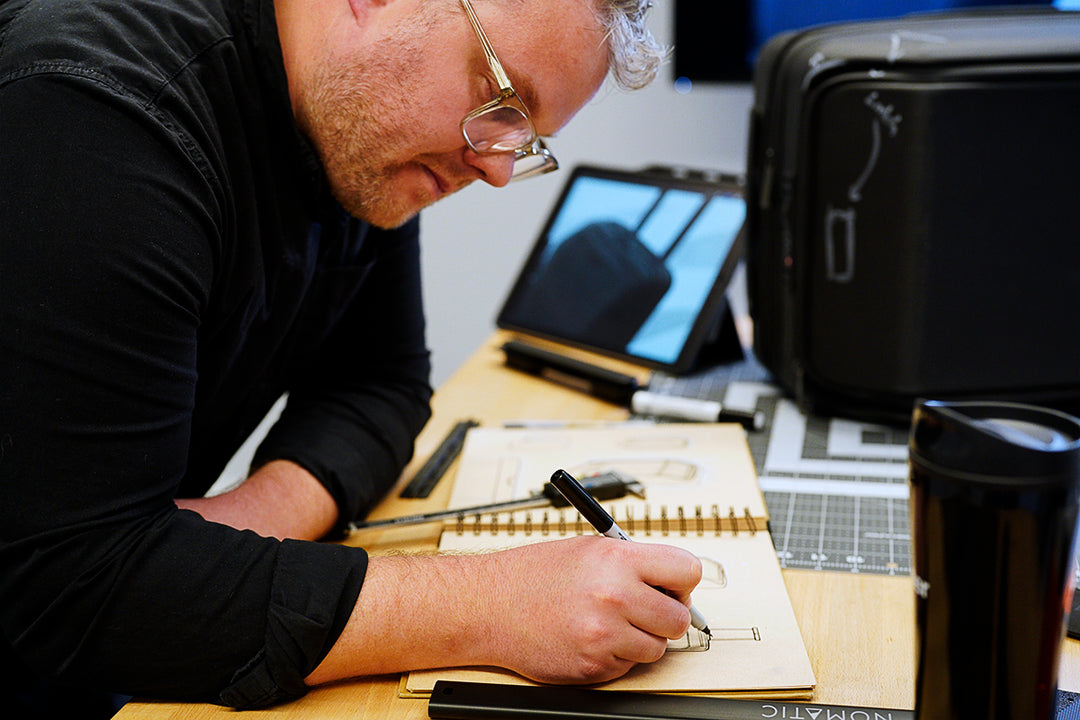Can Music Destroy Stereotypes? Here’s How the Musicians of Black Violin are Achieving the Impossible.

We interviewed Wil Baptiste from Black Violin to discover how he lives Life On The Move.
The term “classically-trained violinist” tends to conjure images of powdered wigs and silk concert dresses — not two big black men. However, that’s exactly who Wilner Baptiste and Kevin Sylvester, the musicians of Black Violin, are.
Both Wil and Kev studied music at universities, know the ins-and-outs of music theory, and are well-versed in the ways of classical composers like Bach. But these facts don’t erase the perceptions people have about Wil and Kev when they see them off the stage.
 Wil said, “I feel like when I walk into an elevator and there’s like, you know, four or five different other people in there, they’re thinking, ‘Hmm let’s see what this guy’s gonna do’ and they’ll double check. Maybe they’re not afraid, but they’re gonna notice.” But Wil’s reaction to this stereotype is surprisingly productive. He said, “In one sense I wish that [the stereotype] didn’t exist and I didn’t sense that, you know, that they were threatened just by my presence without even knowing who I am. Although I wish that it didn’t exist, I’m kind of glad for it because it gives me a goal. It gives me something to debunk.”
Wil said, “I feel like when I walk into an elevator and there’s like, you know, four or five different other people in there, they’re thinking, ‘Hmm let’s see what this guy’s gonna do’ and they’ll double check. Maybe they’re not afraid, but they’re gonna notice.” But Wil’s reaction to this stereotype is surprisingly productive. He said, “In one sense I wish that [the stereotype] didn’t exist and I didn’t sense that, you know, that they were threatened just by my presence without even knowing who I am. Although I wish that it didn’t exist, I’m kind of glad for it because it gives me a goal. It gives me something to debunk.”

 So when Black Violin steps on stage, dissolving stereotypes is their aim. Wil admitted this is his favorite part about playing the viola. “I like that when I play it people look at me funny. The reason why they look at me funny is because they haven’t really been exposed to someone that looks like me playing the way that I play. If they are seeing someone that looks like me they’re probably doing something like robbing a bank or selling weed or something like that,” Wil said. “The fact that I’m actually doing something that is perceived as elegant or high class to them, it’s almost like an oxymoron. It isn’t, but it’s just the way that the narrative has been controlled, so that’s something that I like: Seeing their faces and destroying their misperceptions.”
So when Black Violin steps on stage, dissolving stereotypes is their aim. Wil admitted this is his favorite part about playing the viola. “I like that when I play it people look at me funny. The reason why they look at me funny is because they haven’t really been exposed to someone that looks like me playing the way that I play. If they are seeing someone that looks like me they’re probably doing something like robbing a bank or selling weed or something like that,” Wil said. “The fact that I’m actually doing something that is perceived as elegant or high class to them, it’s almost like an oxymoron. It isn’t, but it’s just the way that the narrative has been controlled, so that’s something that I like: Seeing their faces and destroying their misperceptions.”
In other words, Wil said, “The reason I smile onstage is because I know I’m completely crushing people’s perceptions of not only what a violin can do and what music can sound like, but what a black man is capable of.”
 And that goal of debunking false stereotypes is the focus of Black Violin’s new tour “Impossible.” Of the tour, Wil said, “We think of that word ‘impossible’ and we challenge people to really look at anything they’re trying to do, anything they’re trying to accomplish, their views, and their perspective and challenge them.”
And that goal of debunking false stereotypes is the focus of Black Violin’s new tour “Impossible.” Of the tour, Wil said, “We think of that word ‘impossible’ and we challenge people to really look at anything they’re trying to do, anything they’re trying to accomplish, their views, and their perspective and challenge them.”
Shattering mislaid beliefs about what’s possible was something Wil himself struggled with. He said, “If [20 years ago] I had thought about what I have now, who I am now, that would have seemed impossible.” Growing up the son of Haitian immigrants in a tough area made it easy to believe “the narrative of ‘You can’t achieve anything, you’re not supposed to do these things, you’re not supposed to be successful. The things that are around you — that’s what you’re supposed to do, that’s what you’re supposed to be.”

In fact, Wil often got in trouble with the security guards at school for making a ruckus. One day, one of the guards pulled him aside and told Wil a story about playing the saxophone. Wil took it to heart and decided to sign up for band class. However, a bet between the school’s music teachers landed Wil in orchestra instead, playing the viola.
 Similarly, Black Violin’s other half, Kev, almost succumbed to the expectations that he would become a product of his environment. At age 9, Kev was caught stealing candy. In response, his mom enrolled him in a music class to “get him off the streets.”
Similarly, Black Violin’s other half, Kev, almost succumbed to the expectations that he would become a product of his environment. At age 9, Kev was caught stealing candy. In response, his mom enrolled him in a music class to “get him off the streets.”
In both cases, Wil and Kev used music to escape the narrative that was set for them — to achieve the impossible.
The two met in high school, and as they continued to study music, the blend of hip hop and classical was natural for both of them. “We [combined classical and hip hop] because we were a product of our own environment at first. We happened to play classical music and, for us, hip hop was about expressing yourself and that’s just want we did.”

But again, the seeming impossibilities of what they were creating threatened their success. Of their music, Wil said, “Classical and hip hop: It seems like this impossible thing to do to combine these two genres.”
 Where did their music belong? “People actually just thought it was weird because imagine just being in a club, having a good time and there’s two black dudes walking around playing the violin. I’m thinking about it now, and it is kind of weird.” But although their uniqueness was an obstacle, Wil also attributes their success to it. He said, “When we first started off, we didn’t have anybody to look up to or see or say ‘Oh, we should do it that way.’” This meant their music was absolutely authentic.
Where did their music belong? “People actually just thought it was weird because imagine just being in a club, having a good time and there’s two black dudes walking around playing the violin. I’m thinking about it now, and it is kind of weird.” But although their uniqueness was an obstacle, Wil also attributes their success to it. He said, “When we first started off, we didn’t have anybody to look up to or see or say ‘Oh, we should do it that way.’” This meant their music was absolutely authentic.
Wil and Kev kept doing what felt good to them and eventually got the opportunity to play at the Apollo — a theater where the audience isn’t ashamed to heckle. But instead of insults, Wil and Kev were met with thunderous appreciation.
Soon their music was succeeding in a way had seemed impossible for two black kids from the ghetto. They’ve continued to have success with the launch of their Impossible tour.
Wil believes that Black Violin’s music, as well as their story, will continue to reframe the way people understand what’s possible and dissolving unfounded stereotypes. When asked how that’s possible, he said that music can help people step outside their own experience to develop empathy. He said, “Instead of jump to certain conclusions and certain narratives that have been projected in our society, I think [empathy] would help us to not only educate ourselves, but it would help us to deal with the misperceptions that we all have about one another.”





















